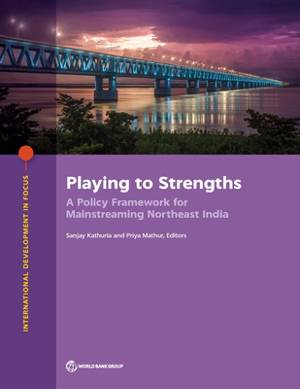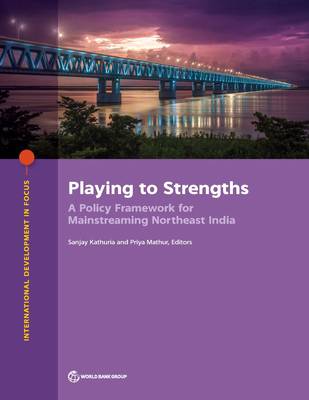
- Retrait gratuit dans votre magasin Club
- 7.000.000 titres dans notre catalogue
- Payer en toute sécurité
- Toujours un magasin près de chez vous
- Retrait gratuit dans votre magasin Club
- 7.000.0000 titres dans notre catalogue
- Payer en toute sécurité
- Toujours un magasin près de chez vous
Playing to Strengths
A Policy Framework for Mainstreaming Northeast India
59,45 €
+ 118 points
Description
It is widely agreed that, over the past decade, accelerating infrastructure investments in India's North Eastern Region (NER) and neighboring countries, along with connectivity agreements with Bangladesh, hold immense promise for unlocking NER's economic potential. Other global trends, such as the growing incomes and consumer awareness in India and neighboring countries; a rising preference for fresh, healthy, safe, environmentally friendly, and socially responsible products; the growing role of services in manufacturing; and increasing demand for skilled resources are also very favorable for NER. Together, these developments can help NER showcase its strengths in agriculture and services, thereby developing value chains in these sectors, which will lead to sustainable, better-paying job opportunities for the people of NER. In this context, the World Bank, in consultation with stakeholders--government, private sector, and academia--analyzed two cross-cutting constraints that are encountered across all value chains and sectors in NER: connectivity and logistics, and product standards and quality infrastructure. To ground the policy in specific contexts, the team studied four sectors in depth: fruits and vegetables, spices, bamboo and related products, and medical tourism. Playing to Strengths lays out an initial policy framework for NER that integrates demand and supply and shows that, even with a low base in manufacturing, NER can leverage its strengths in agriculture and services to step up its growth. However, implementing this framework will require a different approach to doing business compared with the existing ecosystem and its associated value chains, which are mostly geared to local and/or price-conscious consumers. In capitalizing on its advantages, NER will not only accelerate its own development, but also will play an increasingly critical role in the government of India's "Act East" policy.
Spécifications
Parties prenantes
- Editeur:
Contenu
- Nombre de pages :
- 102
- Langue:
- Anglais
- Collection :
Caractéristiques
- EAN:
- 9781464815058
- Date de parution :
- 16-12-19
- Format:
- Livre broché
- Format numérique:
- Trade paperback (VS)
- Dimensions :
- 216 mm x 279 mm
- Poids :
- 349 g

Les avis
Nous publions uniquement les avis qui respectent les conditions requises. Consultez nos conditions pour les avis.





